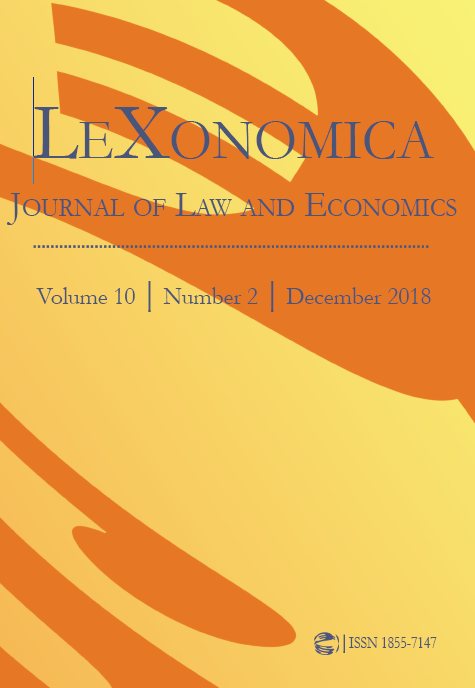Management Coaching Model and Impact of its Activities on Employee Satisfaction
Keywords:
coaching, satisfaction of employees, successfulness of an enterprise, management, modelAbstract
The article tries to answer the research question: What is the potential additive effect on employee satisfaction when using management coaching model and its activities? The purpose of the article has been to form a model of management coaching and of the influence of its activities on employee satisfaction based on theory review and field study results. We have confirmed the main hypothesis (H1: Implementing management coaching model positively influences employee satisfaction) and all of the secondary hypotheses (Hi,j: Implementing activity »i« of the management coaching model positively influences factor »j« of employee satisfaction; i = 1, 2, 3, 4, 5; j = 1, 2, 3, 4, 5) with our empirical study, focused on the employees. The topic is of practical value and it will help managers in Slovenia and abroad understand the effect of the activities of coaching on employee satisfaction.
Managementski model coachinga in vpliv njegovih aktivnosti na zadovoljstvo zaposlenih
V članku smo poskušali odgovoriti na temeljno raziskovalno vprašanje: Kakšen je potencialni dodatni učinek na zadovoljstvo zaposlenih z uporabo managementskega modela coachinga in aktivnosti, ki jih zajema model? Namen našega članka je na temelju teorije s tega področja in spoznanj iz terenske raziskave oblikovati managementski model coachinga in vpliva njegovih aktivnosti na zadovoljstvo zaposlenih. Z empirično raziskavo smo potrdili glavno hipotezo (H1: Izvajanje managementskega modela coachinga pozitivno vpliva na zadovoljstvo zaposlenih.) in vse pomožne hipoteze (Hi,j – izvajanje i–te aktivnosti managementskega modela coachinga pozitivno vpliva na j–ti dejavnik zadovoljstva zaposlenih; i = 1, 2, 3, 4, 5; j = 1, 2, 3, 4, 5.). Na podlagi zgoraj napisanega lahko sklepamo, da je tema izjemno aktualna, njeni rezultati pa bodo omogočili slovenskim in tudi drugim managerjem razumeti pomen in vpliv aktivnosti coachinga na zadovoljstvo zaposlenih.
Downloads
References
Brayfield, A. H. and Rothe, H. F. (1951) An index of job satisfaction. Journal of Applied Psychology, 35, pp. 307–311.
Cahill, J. D. (1996) International Marketing: Your company´s next stage of growth (New York, London: The Haworth Press).
Cajnko, P. (2014) Managementski model svetovalnega mentorstva in vpliv njegovih aktivnosti na zadovoljstvo zaposlenih in uspešnost podjetja. Doktorska disertacija. Maribor: Ekonomsko poslovna fakulteta Univerze v Mariboru.
Camman, C., Fichman, M., Jenkins, jr., D. and Flesh, J.R. (1983) Assessing the attitudes and perceptions of organizational members. V S.E. Seashore, Lawler, E., Mirvins, P.H. in Cammann, C. Assessing organizational change, pp. 71–138 (New York: John Wiley & Sons).
Cornelius, E. T. in Hakel, M. D. (1978) Job Element Inventory. Zapis v podatkovni zbirki. Retrieved on 18.11.2013 from: PsycTESTS. doi: 10.1037/t10252-000.
Čeč, F. (2006) S coachingom do večjih poslovnih in osebnih dosežkov (Zagorje ob Savi: Regionalni center za razvoj).
Dattner, B. (2014) How to Participate in Your Employee˙s Coaching. In Harvard Business Review. Retrieved on 4.2.2015 from: https://hbr.org/2014/11/how-to-participate-in-your-employees-coaching
Desmarais, M. (2005) Contact Center Employee satisfaction & Customer Satisfaction Link (Milwaukee: Manpower).
George, M. J. and Jones, R. G. (1996) Understanding and Managing Organizational Behavior (Addison: Wesley Publishing Company).
Goffee, R. (2006) Follow the Leader. Coaching at Work. Retrieved on 18.9.2013 from: http://www.cipd.co.uk/coachingatwork/articles/Follow+the+leader.htm
Gounaris, S. P. (2006) Internal-market orientation and its measurement. Journal of Business Research, 59, pp. 432–448.
Hall, L. (2006) Tailoring Your Approach. Coaching at Work. Retrieved on 18.9.2013 from:http://www.cipd.co.uk/coachingatwork/articles/Tailoring+your+approach.htm
Hollenbeck, J. and Wright, P. (1994) Human Resource Management (Irwin: Austen Press).
Jarvis, J. (2006) The Rise and Rise of Coaching, Coaching at Work,1(3), str. 26–27
Lawler, E. E. (1994) Motivation in work organizations (San Francisco: Jossey – Bass Publishers).
Leshinsky, M. (2007) Coaching Millions (New York: Lifestyle Enterpreneur Press).
Megginson, D. and Clutterbuck, D. (2007) Techniques for Coaching and Mentoring. (Oxford: Butterworth-Heinemann).
Mihalič, R. (2006) Management človeškega kapitala (Škofja Loka: Mihalič in Partnerji).
Možina, S. (2002) Učeča se organizacija – učeči se management. V Management – nova znanja za uspeh (pp. 12–45) (Radovljica: Didakta).
Oakley, J. (2004) Linking Organizational Characteristics to Employee Attitudes and Behavior (Illinois: Northwestern University Research Center).
Oswald, A. J. and Clark, A. E. (1996) Satisfaction and Comparison Income, Jurnal of Public Economics, 61, pp. 359–381.
Pohlmann, C. (1999) Study on Workplace Satisfaction in Private, Public Sectors (Toronto: Goldfarb Consultants).
Porter, L. W. and Steers, R. W. (1973) Organizational, Work and Personal Factors in Employee Turnover and Absenteeism, Psychological Bulletin 80, pp. 151–176.
Slovenian Human Resource Association (2014) Uspešna konferenca o zavzetosti zaposlenih. Retrived on 3.2.2015 from: http://www.skz.si/uspesna-konferenca-o-zavzetosti-zaposlenih/
Skiffington, S. and Zeus, P. (2003) The Comlete Guide to Coaching at Work (Sydney: McGraw–Hill Companies).
Stemberger, P. J. (2008) Coaching v poslovnem okolju. Retrieved on 6.8.2013 from:http://www.inti.si/images/stories/Vseved/coaching/5_coaching_v_poslovnem_okolju.pdf
Stokes, P. (2008) Just Doing My Job. Coaching at Work 3, p. 58.
Škerlavaj, M. et al. (2007) Organizational learning culture – the missing link between business process change and organizational performance, International Journal of Production Economics, 106 (2), pp. 346–367.
Whitworth, L., Kimsey– House, K., Kimsey– House, H. and Sandahl, P. (2011) Coactive Coaching (Mountain View: Davies–Black Publishing).
Weiss, D. J., Dawis, R. V., England, G. W. and Lofquist, L. H. (1967) Manual for the Minnesota Satisfaciton Questionnaire (Minneapolis: Industrial Relations Center: University of Minnesota)
Downloads
Published
Issue
Section
License
© Univerza v Mariboru, Pravna fakulteta, Univerzitetna založba
Prosti pristop
